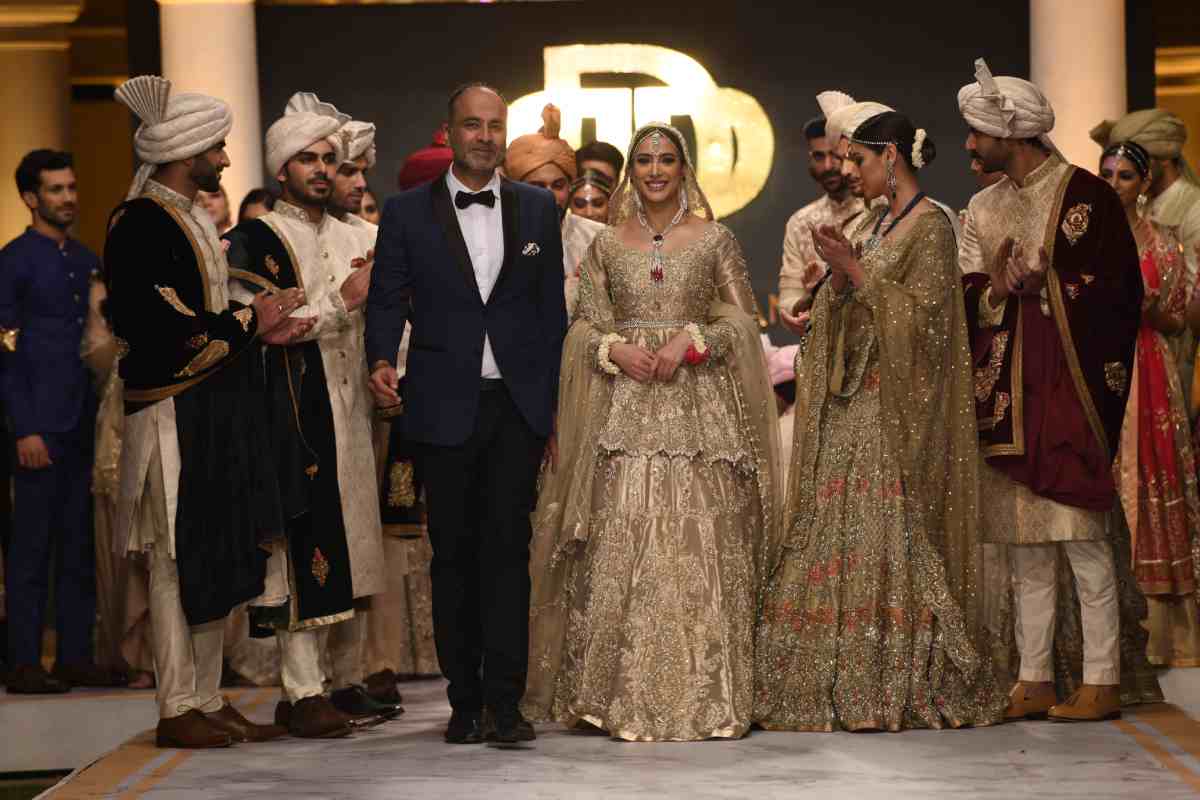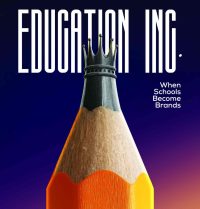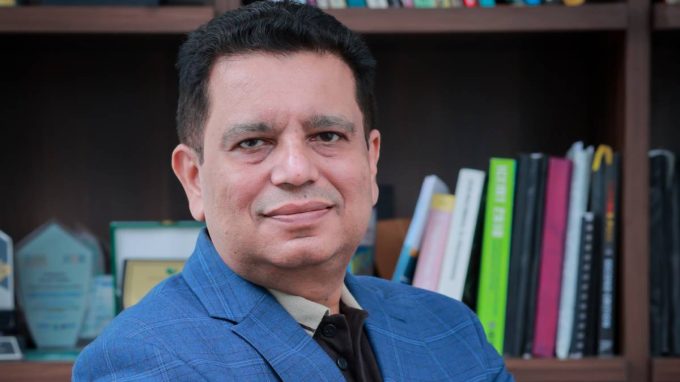Deepak Perwani has been at the heart of Pakistan’s fashion renaissance for over three decades. Once dubbed “the most dangerous fashion show on earth,” the couture maverick has redefined luxury by fusing tradition with modernity. Fearless in creativity and uncompromising in craft, Perwani’s designs embody sophistication while pushing the boundaries of style. Beyond fashion, he champions innovation and mentors the next generation, cementing his legacy as one of Pakistan’s most daring and influential designers.
Synergyzer: Share your journey of building your brand under your own name and label and revolutionising the fashion industry?
Deepak Perwani: Completing 30 years in fashion and design has been a wild ride. Beyond building my label, I explored creative arts and acting. Founding the Fashion Pakistan Council and organising Fashion Pakistan Week added another dimension.

It’s been a rollercoaster: fun, thrilling, and unpredictable. As my business grew, I focused on nurturing future designers, collaborating with schools, colleges, and charitable institutions, sharing my expertise.
This journey, though arduous, has been incredibly fulfilling. Since our humble beginning in 1994 with a single Zamzama store, we’ve expanded to Lahore, Islamabad, and soon, another in Karachi. For me, gradual growth and revolutionising the fashion industry went hand-in-hand.
When we started, fashion as we know it didn’t exist. People made clothes at home, with no ready-to-wear retail. I pioneered affordable, high-end fashion in Pakistan, introducing a novel concept.
However, fashion was becoming too mainstream, almost losing its essence. Every launch, whether it be a bottle or a tablet, was accompanied by a fashion show. We realised regulation was necessary.
To address this, some Pakistani designers, including myself, established the Fashion Council Pakistan. In 2009, we organised Pakistan’s first fashion show, Fashion Pakistan Week (FPW). Marie Claire dubbed it ‘the most dangerous fashion show on earth.’ This marked the beginning of a revolution in Pakistan’s fashion landscape.
The revolution sparked a domino effect. Malls emerged, introducing seasonal concepts: spring, summer, fall, winter, and holiday sales like Mother’s Day, and Black Friday. The industry began to differentiate between winter and summer fashion, embracing trends.
This once non-existent scene transformed into a competitive environment. Designers now create four collections annually. Fashion evolved into an industry, employing civilians and requiring specialised professionals: textile designers, window dressers, makeup artists, coordinators, and merchandisers.
This newfound industry opened doors to employment opportunities in Pakistan. Consider where fashion was 15 years ago. Our tireless efforts transformed the industry.
Export powerhouses like Gul Ahmed, Nishat, and Chen One, previously focused solely on international markets, took notice of the local impact. They expanded into domestic retail, achieving remarkable success. Our perseverance was crucial. We could have settled for small-scale success, but we envisioned something monumental. We revolutionised an entire industry!
Synergyzer: What is your process of designing, creating, and releasing your collections?
Deepak Perwani: My design process is rooted in originality, style and edge. As a progressive thinker, I draw inspiration from international creators during my frequent travels, almost 6-8 times a year.
I excel at reinterpreting influences, blending Pakistani elements with global style. To stay relevant, I design three collections simultaneously: New Year’s, Weddings, Eid, Pre-fall, and Summer.
For women, I create eight collections annually; for men, six. This fast-paced production ensures timely releases. Every designer’s unique style is their greatest asset. I take risks, pushing boundaries to ensure my collections stand out.
Synergyzer: How have you stayed on top of the game years later?
Deepak Perwani: To maintain our position, we have focused on premium quality. Deepak Perwani is not an extremely high-end or budget-friendly brand. But it is a luxury brand offering high-quality fabrics, exceptional craftsmanship, and impeccable techniques.
Our target audience is discerning individuals seeking indulgence, quality, and luxury. Our clientele, largely Pakistani and Indian diaspora in cities like Dubai, London, New York, Paris, and Sydney, value the excellence of our fabrics, workmanship, and brand heritage.
They are invested in the Deepak Perwani experience. A life of lavishness, often passed down through generations. Traditional design has inherent marketing value, as pieces are passed down as family heirlooms. Designer wear is invested in for generations, not just for one event. Its value appreciates over time.
However, we do not rely solely on this. We actively market ourselves through social media, fashion shows, exhibitions in Dubai, London, Singapore, and Hong Kong. And, of course, targeted advertising.
Synergyzer: Beyond advertising, what relationship-building strategies do you employ to ensure your brand remains at the forefront of the minds of your customers?
Deepak Perwani: Our main focus is on innovation and exclusivity. Catering to Pakistan’s luxury market, the 1%. They demand constant evolution and exceptional quality. They are well-versed in global fashion trends.
To stay ahead, we continuously innovate and push boundaries, offer bespoke menswear, a niche area few designers explore and leverage our expertise in cloth, our core strength. Our diverse portfolio includes hotel uniforms, school uniforms and specialised uniforms for the cardiac society. This versatility showcases our international, local, and global influence.
Synergyzer: Elaborate on your design philosophy for each gender, considering the unique preferences and styles they seek?
Deepak Perwani: I delight in designing for both men and women. My philosophy revolves around ‘twinning’, creating harmonious, cohesive looks for couples. This concept fosters homogeneity, integrating individual styles into a unified aesthetic.
For shadi wear, twinning is particularly crucial, ensuring the bride and groom’s outfits share a consistent thread. Today, visual storytelling dominates, with Instagram-worthy moments driving design decisions.
Family pictures, backgrounds, flowers, and every detail is considered for phone screens. Traditionally, Pakistani weddings follow colour-coded events. A basic generalisation would be. For the Nikkah, the bride-to-be wears white, for the Mayoun, yellow or orange is preferred, and a colourful outfit for the Henna function. The new trend is the Choli Gharaara or the Choli Ghagra. For Valima, an icy blue jora and for the shaadi, a red dress or a pink one.
Pakistanis instinctively associate these colours with each occasion, guiding family attire to harmonise with the bride, groom, and venue. My design approach remains consistent: I envision men and women as confident, stylish, and sexy and sensual.
My audience appreciates luxury, recognising quality fabric, impeccable finish and fall and cut. We occasionally take risks, and they embrace them. Other times, we play it safe, and they still respond well, as it aligns with the Deepak Perwani design philosophy.

Synergyzer: Who are five designers you deeply admire, and how has their approach influenced your own creative journey?
Deepak Perwani: I deeply admire five designers who have significantly influenced my creative journey:
- Yves Saint Laurent – A global icon and French design legend, renowned for empowering women with androgynous styles like the Le Smoking jacket. Incomparable!
- Tom Ford for Gucci – Revolutionised Gucci with his sexy, New York-inspired aesthetic, and successfully established his eponymous brand.
- Alexander McQueen – If fashion was art, it would be Alexander McQueen, a genius leaving an indelible mark despite his tragic demise.
- Maheen Khan – A master of minimalistic design, showcasing the difficulty and beauty of restraint.
- Rizwan Beyg- A Pakistani design stalwart, expertly blending calm, collected styles with revived traditional techniques. His knowledge of craft is unparalleled!
Synergyzer: How do you feel about your designs being copied and replicated? Do you think this affects your brand, and how do you address this issue?
Deepak Perwani: Copying and replication come with the territory of high-end design. Iconic brands like Chanel, Prada, Dior, and Hermès are constantly replicated. Initially, I would get upset, but now I view it as a compliment; I just take it as a form of flattery and laugh about it.
Synergyzer: As you envision the next five years, what exciting design trends and innovations can your loyal customers expect from your brand?
Deepak Perwani: Looking ahead to the next five years, our loyal customers can anticipate:
- New Flagship Store: We’re unveiling our 4,000 sq. ft. store on Khayaban-e-Shahbaz, showcasing menswear, women’s wear, couture, and ready-to-wear.
- Perfume Launch: Our signature fragrance debuts soon.
- Solo Show: An exclusive runway event showcasing our latest designs.
So, lots of exciting stuff is coming towards our clients. And this is just the beginning for the brand. We have just finished our 30 years and 30 more to go
Synergyzer: Does the focus on celebrity endorsements and influencer collaborations in fashion campaigns overshadow the creative artistry of designers?
Deepak Perwani: Celebrity endorsements and influencer collaborations have limited impact on high-end fashion sales in Pakistan. The local focus is on drama and television stars, catering to a distinct audience.
This demographic differs from our target market – affluent individuals who travel to global fashion hubs like London, Paris, and New York. While celebrity endorsements may generate interest abroad, they don’t necessarily translate to significant sales for luxury brands like mine.

Synergyzer: Is Deepak Perwani’s brand guilty of reinforcing elitist fashion narratives by emphasising luxury and exclusivity in his advertising, potentially alienating the broader public from engaging with high fashion?
Deepak Perwani: High-end brands, by definition, are elitist. We cater to a specific clientele seeking exclusive luxury. Comparing H&M or Zara to Dior or Chanel is apples and oranges.
Luxury brands profit majorly from: Belts, shoes, glasses and bags. Our bridal market focus isn’t alienating; we’re reasonably priced within our niche. Brands must choose their direction: low-end or high-end. You can’t be both. Red Bull won’t lower its price to match Pepsi’s. That’s the luxury premium. Simple!
Synergyzer: Has the rise of influencer marketing diluted the exclusivity and authenticity of luxury fashion brands, turning them into mass-market commodities?
Deepak Perwani: Influencer marketing effectively reaches consumers, showcasing real people wearing luxury fashion. This relatability resonates more than traditional celebrity endorsements. Of course, that works, and I think I find it far more effective than putting your clothes on a star because everybody’s putting their clothes on a star and selling teas, soaps, and you know, phenyl!










